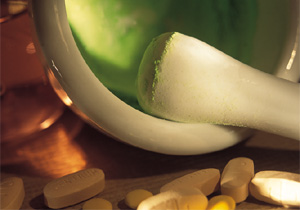Materia Medica - Important
Disclaimer
The information that is available at or
through this site is not intended directly
or by implication to either diagnose or
treat any medical, emotional, or
psychological condition or disorder. It
is always recommended that consultation
with local health care providers be
obtained for specific health or medical
concerns.
Pharmaceutical Name

Fructus Amomi kravanh
Botanical Name

1. Amomum kravanh Pierre ex Gagnep. 2. Amomum compactum Soland. ex Maton
Common Name

Round cardamom seed
Source of Earliest Record

Kaibao Bencao
Part Used & Method for Pharmaceutical Preparations

The yellow fruit is gathered from October to December, dried in the sun and broken into pieces.
Properties & Taste

Pungent and warm
Meridians

Lung, spleen and stomach
Functions

1. To promote qi circulation and transform dampness;2. To warm the spleen and stomach and stop vomiting
Indications & Combinations

1. Dampness blocking spleen and stomach or qi stagnation in the spleen manifested as distension, fullness and no appetite. Round cardamom seed (Baidoukou) is used with Magnolia bark (Houpo), Atractylodes rhizome (Cangzhu) and Tangerine peel (Chenpi).
2. Early stage of damp-heat febrile diseases manifested as stifling sensation in the chest, absence of hunger and sticky tongue coating. Round cardamom seed (Baidoukou) is used with Talc (Huashi), Coix seed (Yiyiren) and Amomum fruit (Sharen) in the formula Sanren Tang. For cases of excess heat, Round cardamom seed (Baidoukou) is used with Scutellaria root (Huangqin), Coptis root (Huanglian) and Talc (Huashi) in the formula Huangqin Huashi Tang.
3. Vomiting due to cold in the stomach. Round cardamom seed (Baidoukou) is used with Agastache (Huoxiang) and Pinellia tuber (Banxia).
4. Infantile vomiting due to cold in the stomach. Round cardamom seed (Baidoukou) is used with Amomum fruit (Sharen) and Licorice root (Gancao).
Dosage

3-6 g
Back
to Materia Medica
| 
 This website is published, edited and designed by Raymond Cheng,
and reflects only and only his personal views and opinions in his individual capacity.
The information available at this website is not intended
directly or by implication to either diagnose or treat any
medical, emotional, or psychological condition or disorder.
It is also not intended to create a physician-patient relationship
between you and I or between you and Wyith Institute™ and The Office of Dr Raymond K K Cheng.
The information here is not a substitute for advice and treatment provided
by your physician or by another healthcare professional.
It is always recommended that consultation with local healthcare providers
be obtained for any of your specific health or medical concerns.
Furthermore, any products that can be purchased (yet you can see I don't have much
to sell here) through advertisers' banners or through links to other websites
are not either explicitly or implicitly given any warranty or endorsement
by me, my colleagues, Wyith Institute™ or any of its associated businesses.
This website is published, edited and designed by Raymond Cheng,
and reflects only and only his personal views and opinions in his individual capacity.
The information available at this website is not intended
directly or by implication to either diagnose or treat any
medical, emotional, or psychological condition or disorder.
It is also not intended to create a physician-patient relationship
between you and I or between you and Wyith Institute™ and The Office of Dr Raymond K K Cheng.
The information here is not a substitute for advice and treatment provided
by your physician or by another healthcare professional.
It is always recommended that consultation with local healthcare providers
be obtained for any of your specific health or medical concerns.
Furthermore, any products that can be purchased (yet you can see I don't have much
to sell here) through advertisers' banners or through links to other websites
are not either explicitly or implicitly given any warranty or endorsement
by me, my colleagues, Wyith Institute™ or any of its associated businesses.



 Thank you for visiting this TCM and acupuncture information website.
If you have previously been to this website, you might have
noticed that some of the pages on ancient historical ideas and
holistic thinkings related to Chinese metaphysics are temporarily taken offline.
This is because I will be revamping the whole website and be moving
those information into a new \"Ancient Chinese Culture\" section
so as to reflect a more current perspective on the interpretation
of some of the fundamental concepts as well as to include
some of the latest information in the area.
But if you have just found this website for the very first time, I welcome you again and
wish you could find what you require and, hopefully, you could also be benefitted
from reading the articles I published on this website.
Thank you for visiting this TCM and acupuncture information website.
If you have previously been to this website, you might have
noticed that some of the pages on ancient historical ideas and
holistic thinkings related to Chinese metaphysics are temporarily taken offline.
This is because I will be revamping the whole website and be moving
those information into a new \"Ancient Chinese Culture\" section
so as to reflect a more current perspective on the interpretation
of some of the fundamental concepts as well as to include
some of the latest information in the area.
But if you have just found this website for the very first time, I welcome you again and
wish you could find what you require and, hopefully, you could also be benefitted
from reading the articles I published on this website.